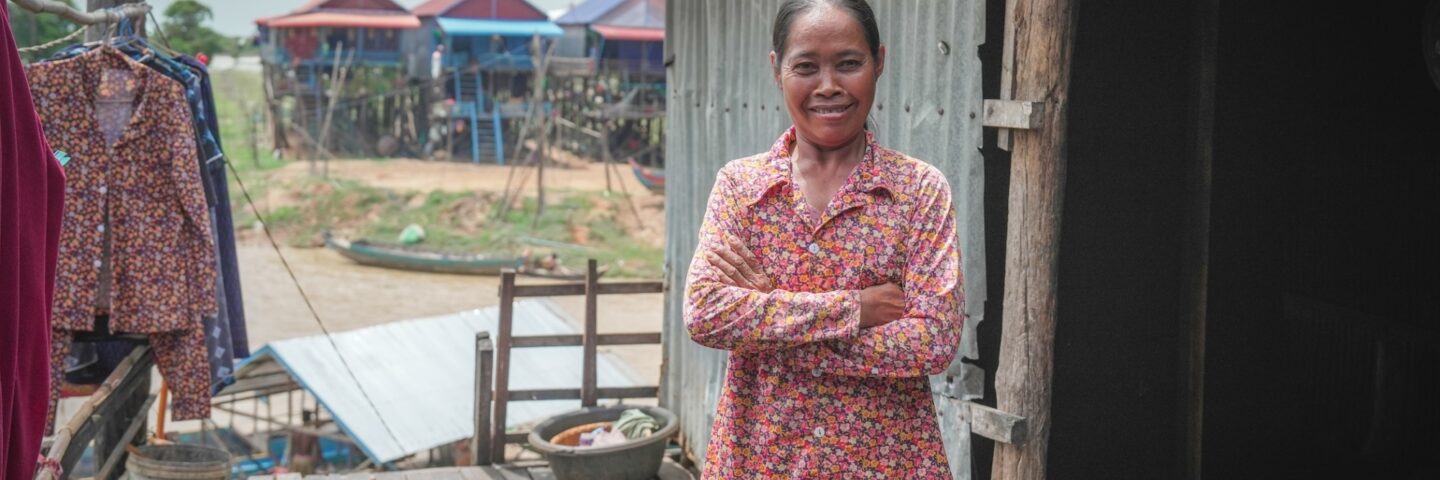
Climate Resilient Water, Sanitation and Hygiene Scale-Up Program (CR-WASH-SUP)
Timeline: January 2023 – December 2024 | Budget: USD $2.4 million | Country: Cambodia
In January 2025, iDE Cambodia successfully completed implementation of CR-WASH-SUP, an extension of its flagship market-based sanitation program known as Sanitation Marketing Scale-Up (SMSU). With a focus on reaching the most systemically marginalized, flood-prone and climate-vulnerable households across Siem Reap Province, Cambodia, the program facilitated the installation of affordable, desirable and resilient water, sanitation and hygiene (WASH) products to over 5,000 households. iDE also contributed to the increase in latrine coverage in Siem Reap from 80% in 2022 to 88% in 2024.
What Did The Project Do?
Through a systems-strengthening and inclusive, market-based approach, iDE increased equitable access to and use of WASH services in rural Cambodia. iDE’s market based approach is four-fold and focuses on:
Human Centered Design: Sanitation products and services tailored to local contexts and needs.
Strengthening Sustainable WASH Markets: Local sanitation businesses coached, strengthened and equipped to deliver affordable, climate-resilient sanitation solutions.
Demand Generation and Social Behaviour Change: Sales agents conduct door to door sales to generate demand, enabling long-term social behavior change.
Capacity Building: Local authorities supported to strengthen their knowledge on open defecation free (ODF) sustainability and climate change.
Since the inception of iDE’s WASH program in 2009, over two million people (approximately 412,000 households) have gained access to improved sanitation through iDE-connected entrepreneurs, representing one in five of all rural Cambodian households. By motivating stakeholders such as households, businesses, and local authorities to invest in their own sanitation solutions, iDE fosters a sense of local ownership and commitment, which is essential for sustaining achievements in dignified access to improved sanitation.
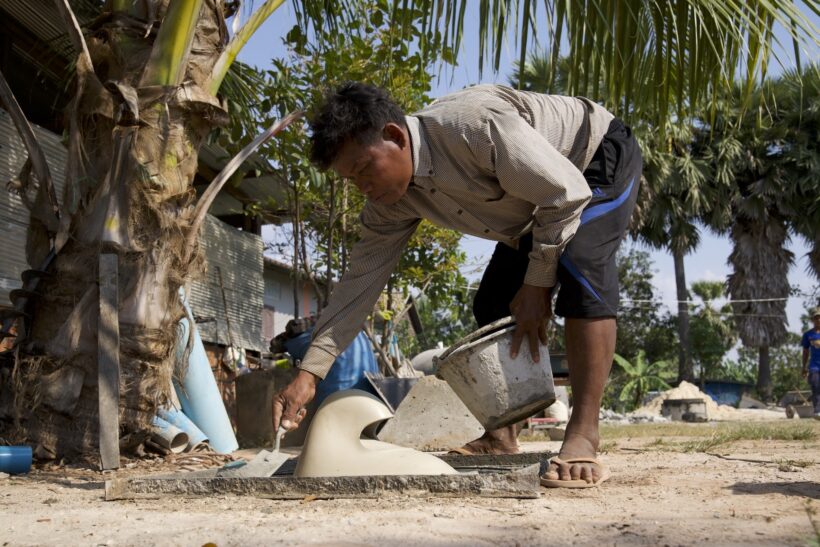
iDE supported sanitation entrepreneur, Mr. Soan Tan, lays concrete to manufacture a pan slab. Photo by Jake Meyers for iDE Cambodia.
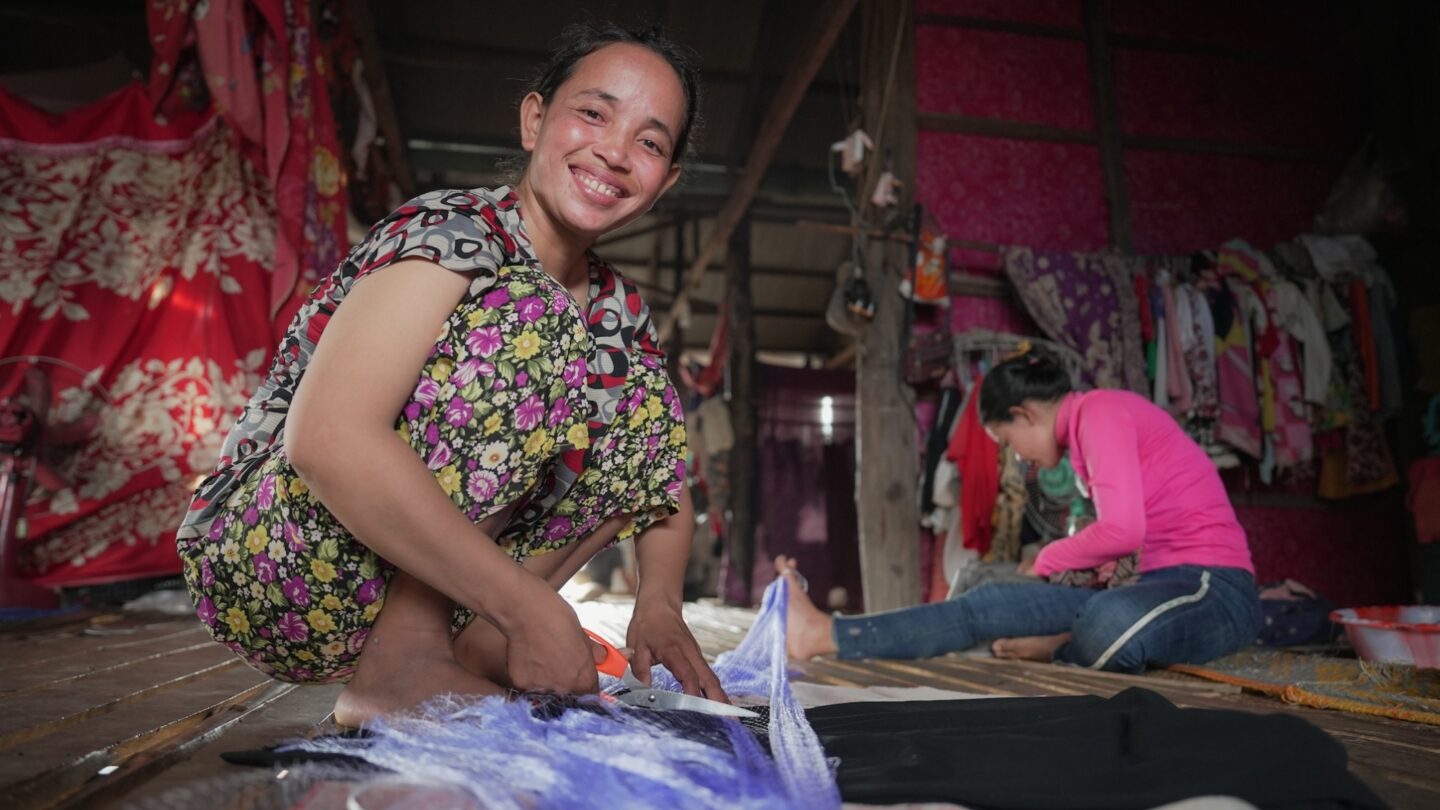
Photo by Kimlong Meng for iDE Cambodia.
Human-Centered Design
Rural households in sanitation-challenging environments (SCEs) face multiple challenges from seasonal flooding and high groundwater to dense, “low-infiltration” soils. These conditions often cause pour-flush latrines to fill quickly or fail, increasing the risk of unsafe fecal sludge management (FSM) and environmental contamination.
iDE applies the human-centered design (HCD) approach to develop climate-resilient, context-specific solutions. Products are developed with community input through interviews, prototyping, and field testing and continuously improved and iterated on based on user feedback. All products are built with locally available materials and prioritize affordability, durability, quality, and year-round functionality.
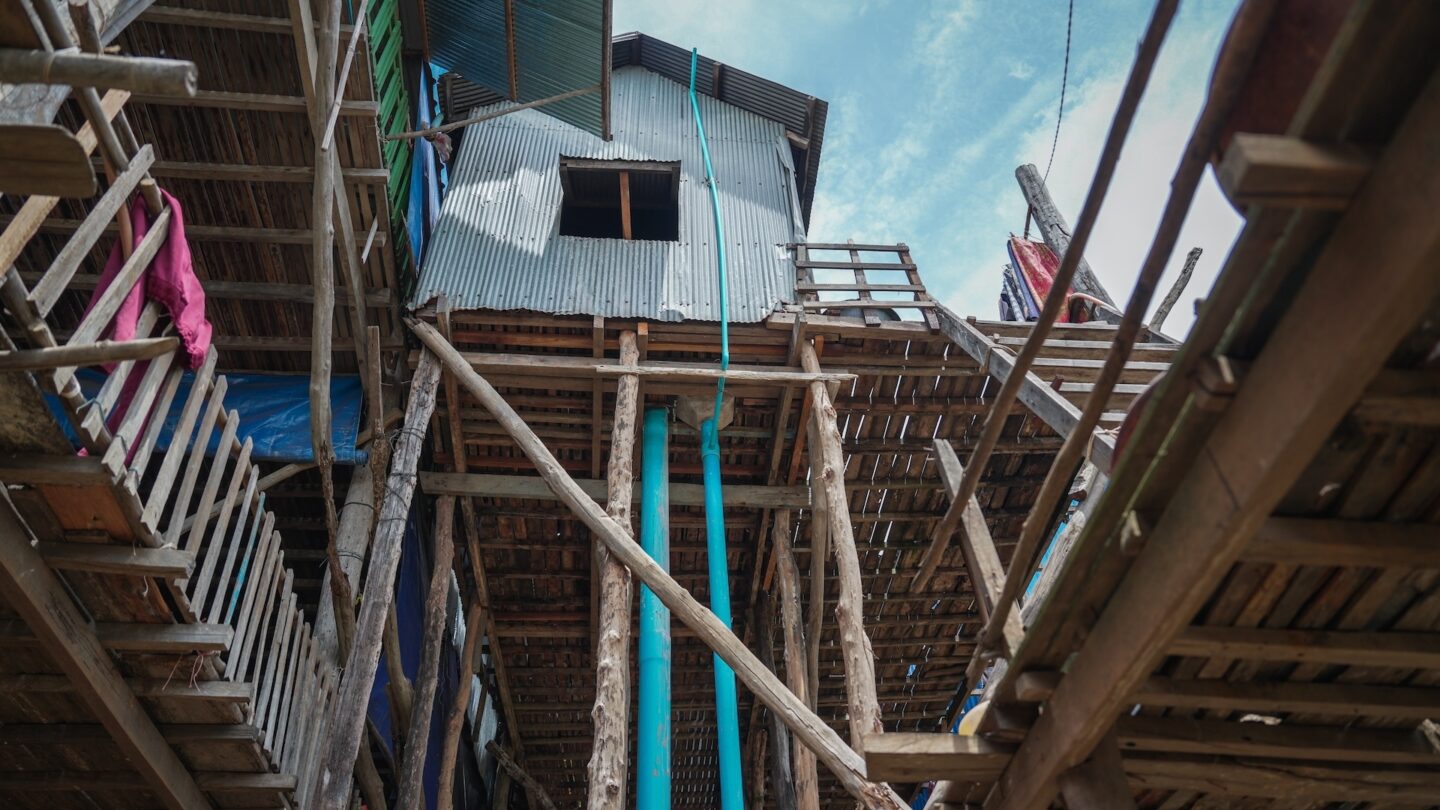
A Sky Latrine installed inside a family home above the high water mark in Kampong Khleang commune, Siem Reap. Photo by Kimlong Meng for iDE Cambodia.
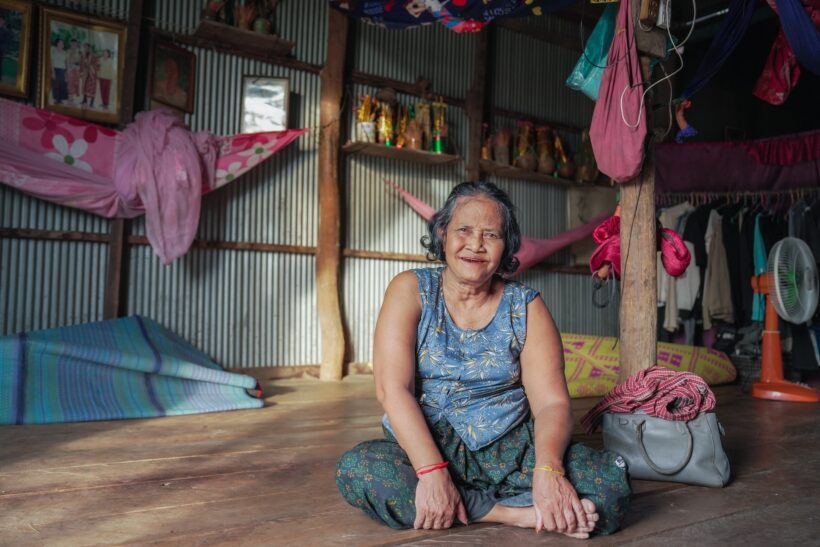
Ms. Chou Eam, a 65 year old grandmother and resident of Kampong Khleang commune, is the proud owner of a Sky Latrine. Photo: Kimlong Meng for iDE Cambodia.
Strengthening Sanitation Entrepreneurs
At the core of CR-WASH-SUP was a commitment to build resilient, inclusive rural sanitation economies driven by local sanitation entrepreneurs. Entrepreneurs were coached and mentored on technical, financial, and marketing business skills on a weekly basis. iDE supported 20 sanitation businesses to cumulatively earn USD $432,074 in net revenue from sales of sanitation products and services. 94% of surveyed sanitation entrepreneurs agreed iDE helped them grow their businesses; 100% said it improved their impact in the community.
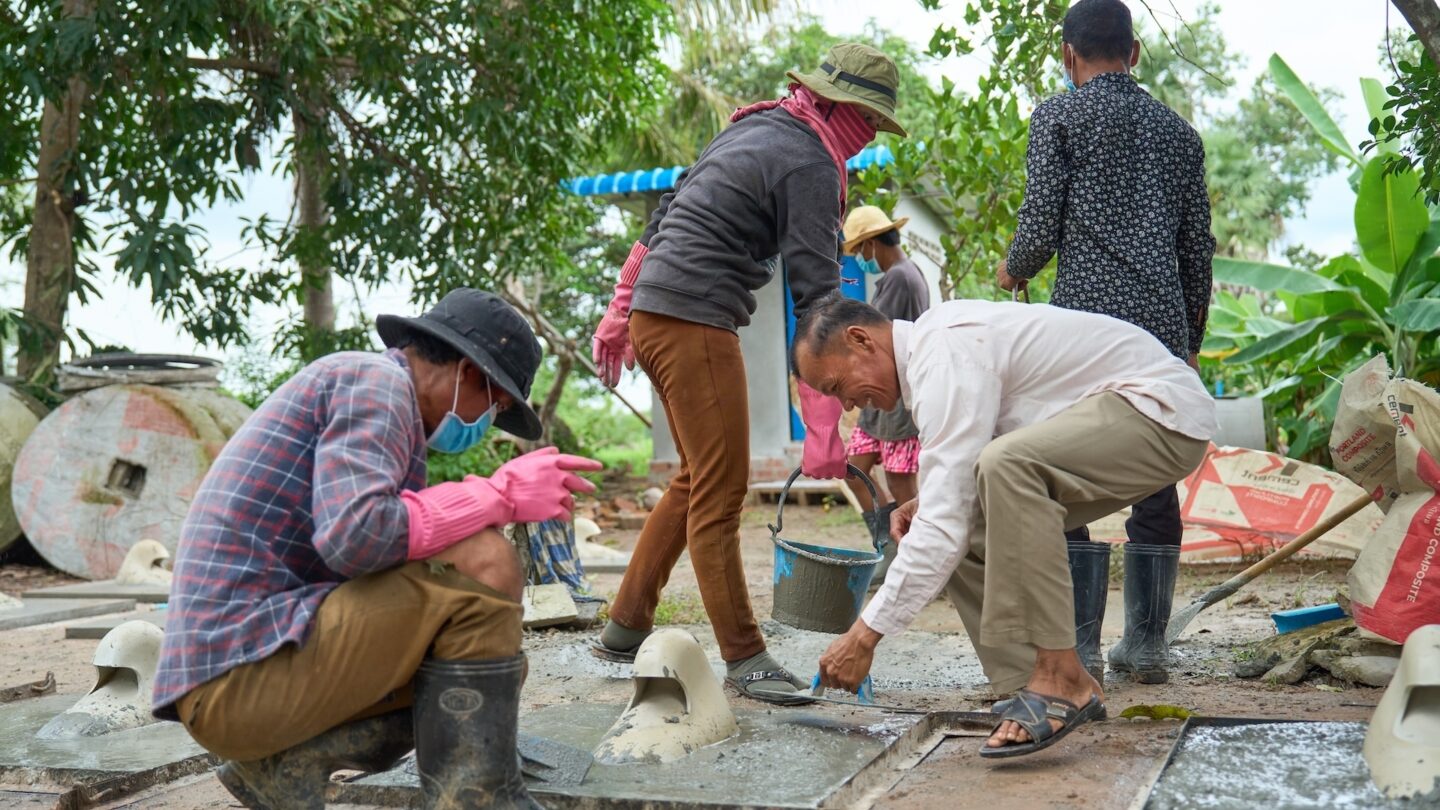
"Diversifying my business helps me serve my community better, especially those in flood-prone villages who need safe, year-round toilets," says Mr. Khut Khon (right), sanitation entrepreneur based in Kampong Khleang Commune, Siem Reap. Through CR-WASH-SUP, iDE supported Mr. Khut Khon to expand his business to sell, manufacture and deliver the innovative Sky Latrine, enabling households in his community to safely and continuously use toilets during floods. Photo by Kimlong Meng for iDE Cambodia.
Demand Generation and Social Behavior Change
Powered by a network of professional, local sales agents, iDE connects with households to offer affordable sanitation solutions. During CR-WASH-SUP, iDE’s sales agents conducted 36,105 household sales presentations across Siem Reap. Using visual “sight sellers,” sales agents promote iDE’s WASH products as well as information on healthy sanitation behaviors. Through solution-oriented messaging, sales agents strive to understand the challenges facing their potential customers and tailor their presentations based on context-specific challenges or issues like flooding or pit overflow.
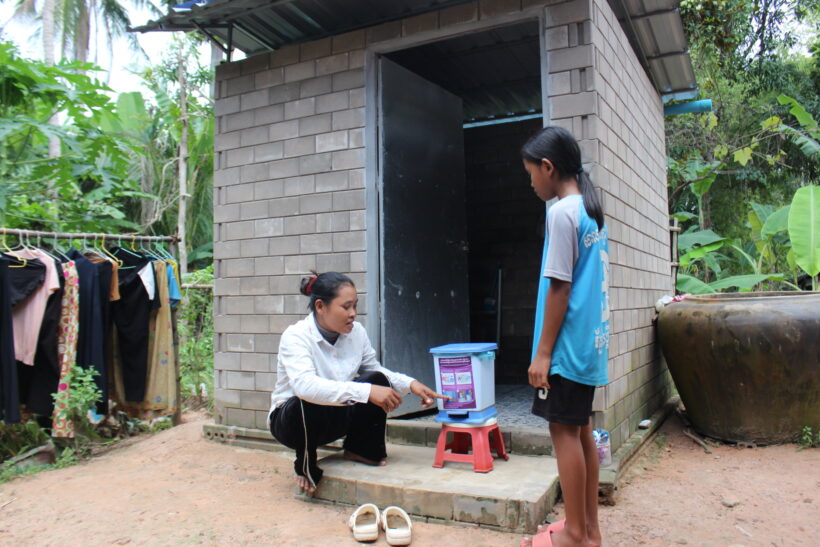
Mrs. Teb Mey (left) with her niece, Rath Monika, using iDE’s MH sticker to explain MH and proper menstrual product disposal outside of an iDE designed Interlock Shelter. Credit: Arunima Shrestha, iDE
Capacity Building of Local Authorities
iDE equips local authorities with technical skills and tools to promote sustainable sanitation. iDE provides a gender-sensitive training of trainers (ToT) curriculum with three modules focused on WASH-related climate risk mitigation and behavior change. Additionally, iDE fosters relationships and networks between sanitation entrepreneurs and local authorities, including through commission-based sales referral agreements, ensuring ongoing sanitation demand in communities beyond the project’s duration. During CR-WASH-SUP, 169 district and commune-level authorities (59% women) were directly trained, who then trained 262 village-level authorities (63% women). Pre-and post-tests showed significant knowledge retention in sustainable ODF maintenance (from 59% to 98%) and in handwashing, child feces, and menstrual health management (from 72% to 90%).
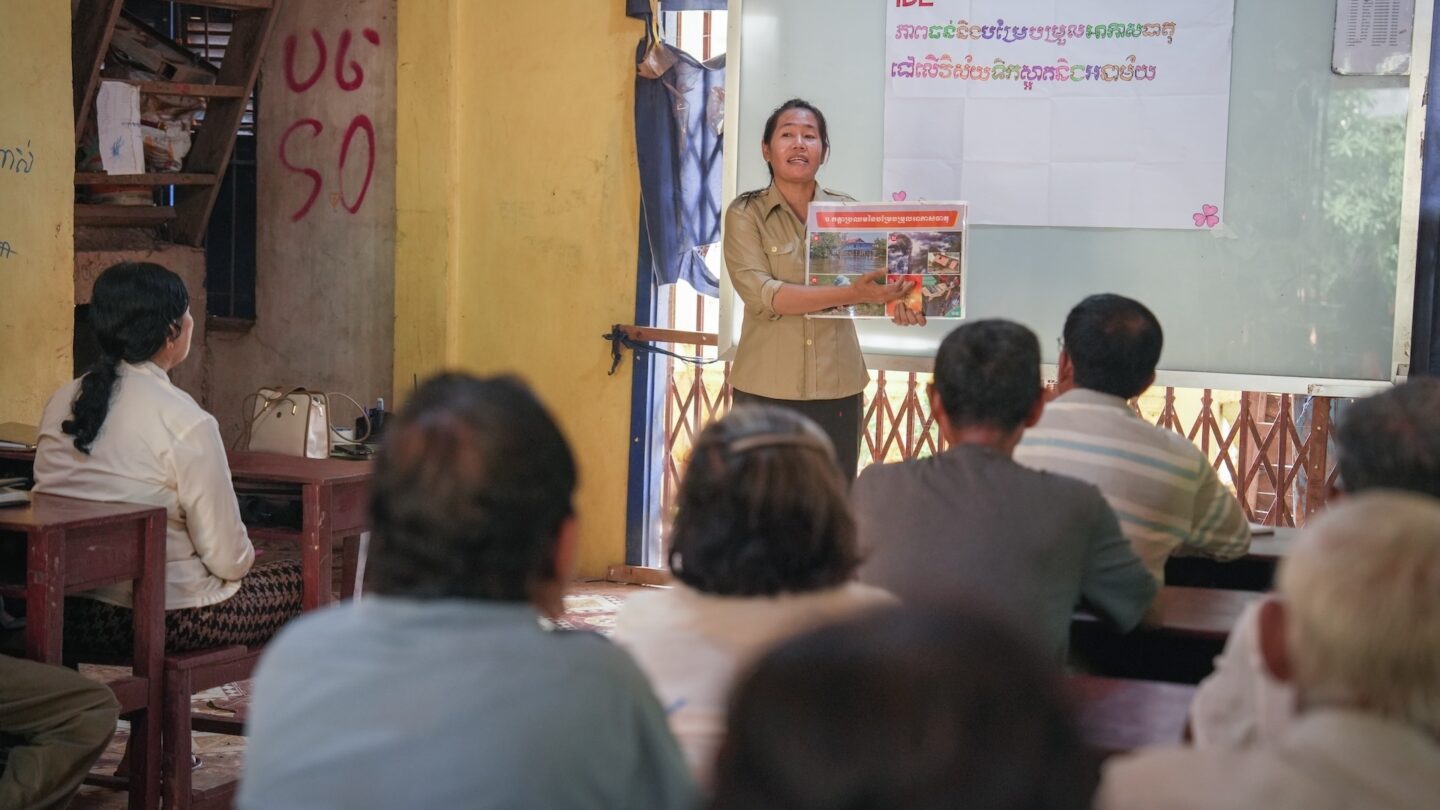
iDE equips local authorities with technical skills and behavior change tools to promote sustainable sanitation. Photo by Kimlong Meng for iDE Cambodia.
What’s next?
While CR-WASH-SUP laid the foundation for a more climate-resilient, inclusive, rural sanitation market system in Cambodia, the work is not finished. From 2025 onwards, iDE Cambodia’s WASH program intends to facilitate access to climate-resilient sanitation for the remaining households without basic latrines and scale up affordable, safely managed sanitation products and services to rural Cambodian households
Download CR-WASH-SUP’s Key Resources:
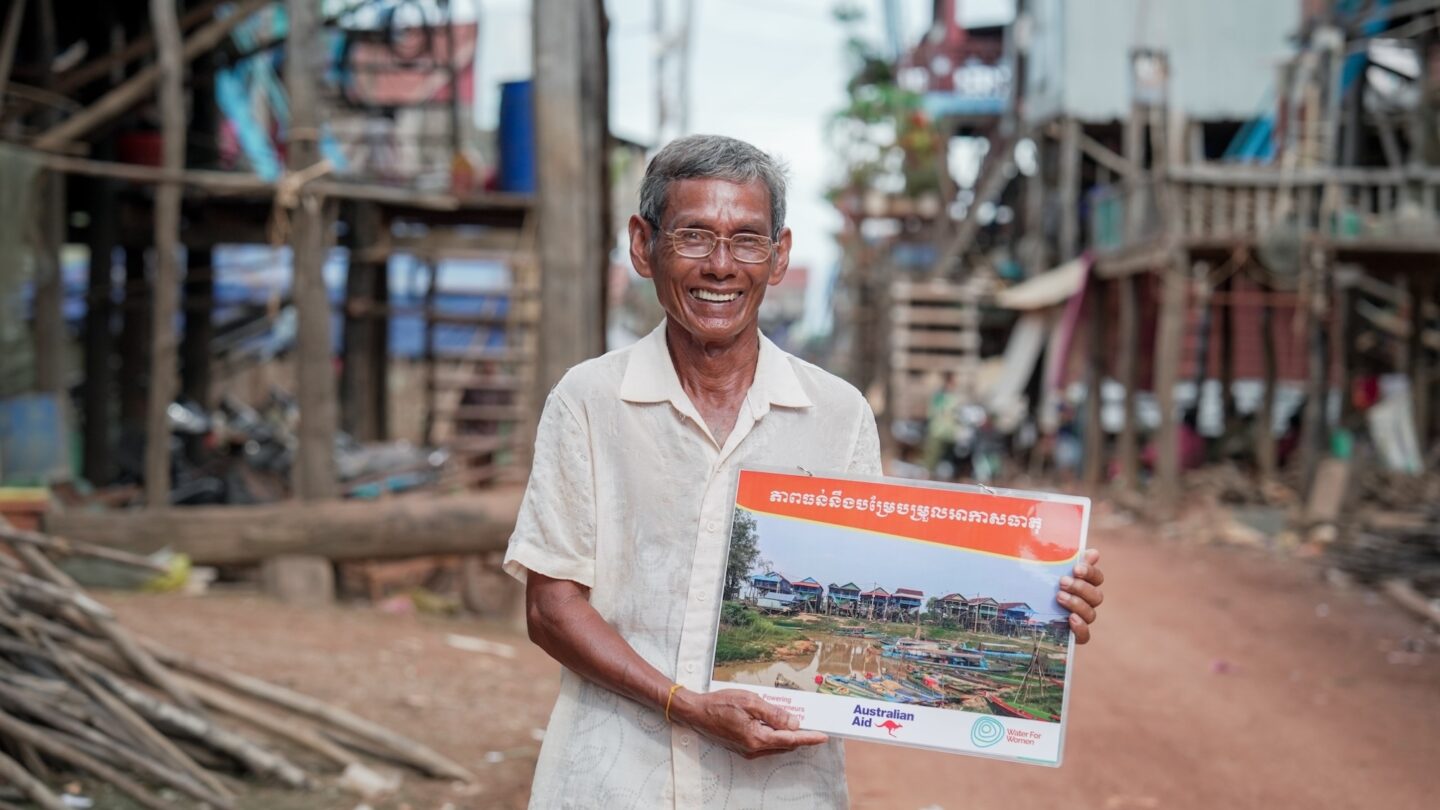
Mr. Mao Tra, village chief from Ta Chro Neang Village, Siem Reap, has been instrumental in improving his community’s access to sanitation and wellbeing. Photo by Kimlong Meng for iDE Cambodia.
CR-WASH-SUP In The Press:
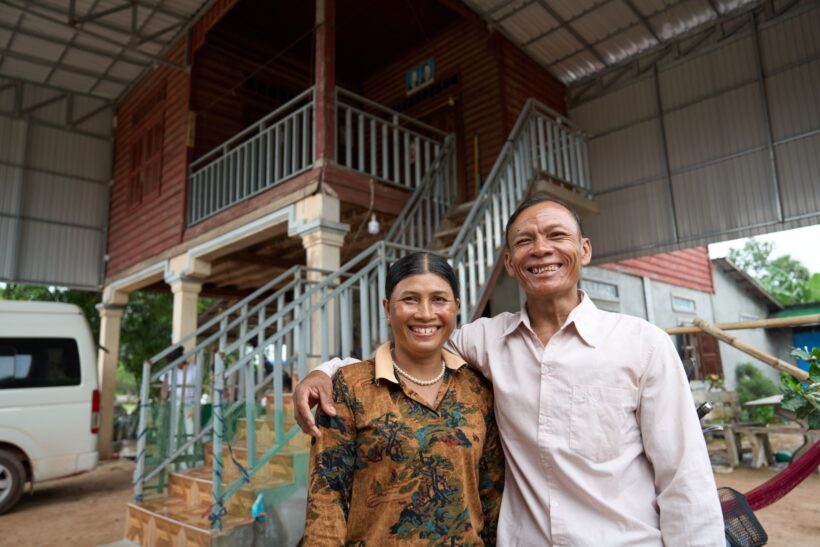
From 2025 onwards, iDE Cambodia's WASH program intends to facilitate access to climate-resilient sanitation for the remaining households without basic latrines and commercialize affordable, safely managed sanitation products and services to rural Cambodian households. Photo by Kimlong Meng for iDE Cambodia.

Read More
